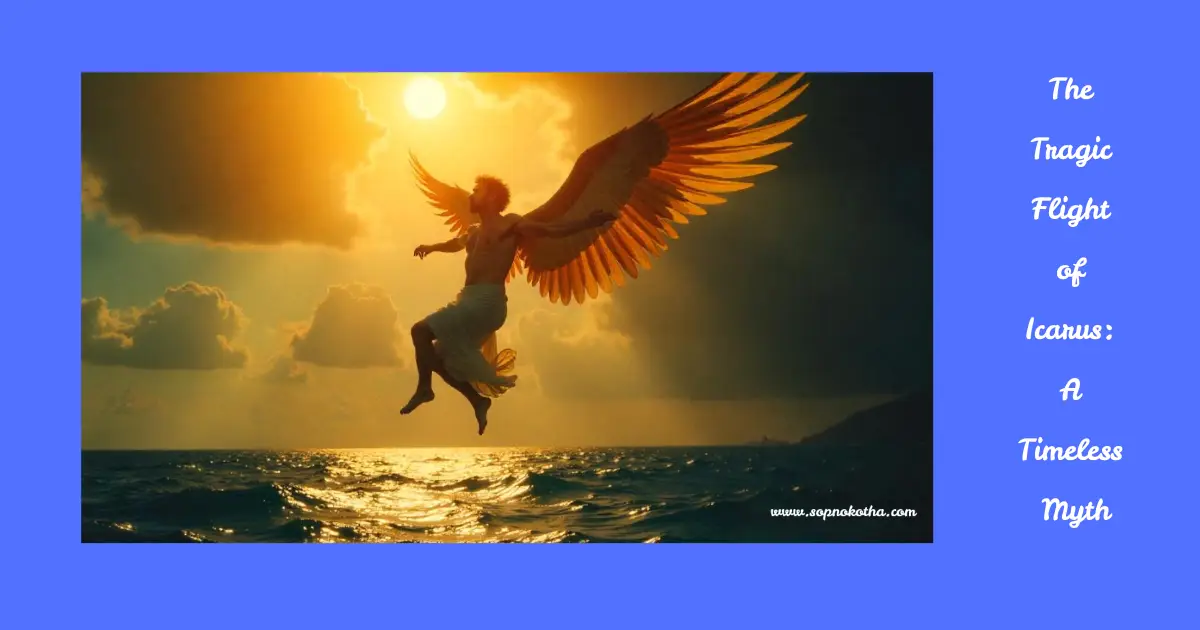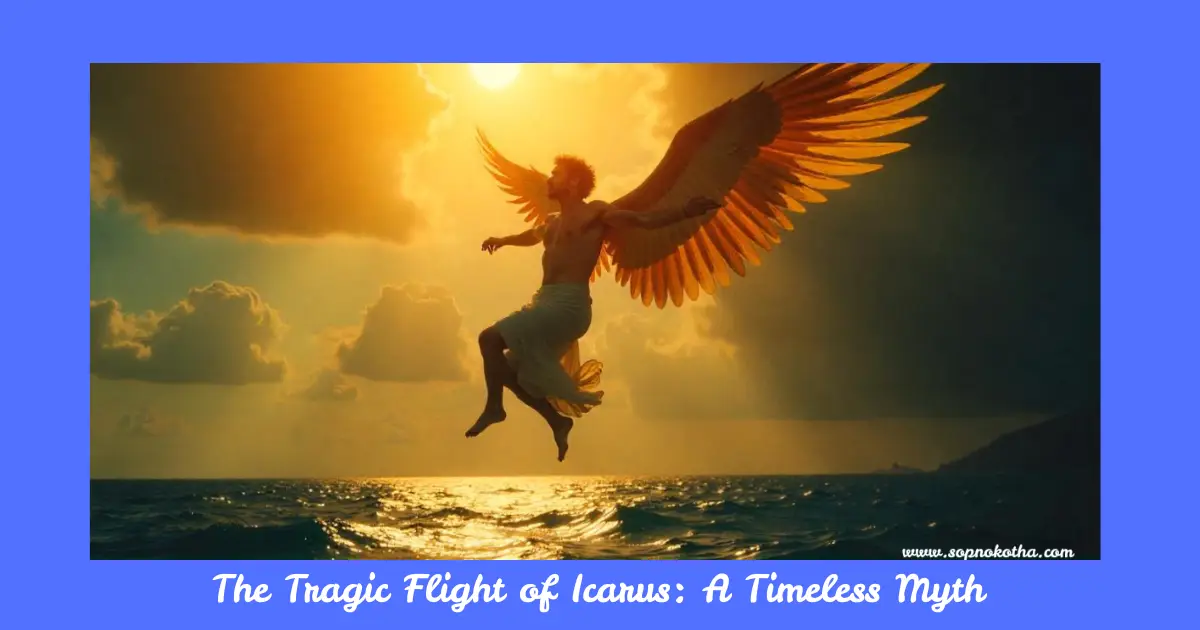The myth of Icarus is one of the most enduring and symbolic tales from Greek mythology. It tells the story of a young boy whose excitement and ambition led to his downfall. Crafted with emotion, tragedy, and a moral lesson, the story explores the consequences of defying limitations and ignoring wisdom.

In this article, we dive deep into the myth of Icarus, his daring flight, and the everlasting message it conveys.
Folk Music: Powerful and Timeless message of Lalon Shah U2L2
Icarus:
On the island of Crete, the fearsome Minotaur, a creature that was half-man and half-bull, terrorized the inhabitants. To contain the beast. King Minos enlisted the help of Daedalus, a masterful architect and inventor. Daedalus constructed an intricate labyrinth so complex that escape was nearly impossible. Once the Minotaur was imprisoned within the maze, King Minos believed he had the perfect trap for his enemies, who would be sent into the labyrinth to meet a gruesome end.
However, King Minos, no longer needing Daedalus, cruelly imprisoned the inventor and his son, Icarus, within the same labyrinth. Yet, Daedalus, familiar with the labyrinth’s design, managed to escape with Icarus. After fleeing, they found themselves stranded on the island with no means of escape by sea.
Observing the birds flying above, Daedalus was inspired to craft wings from feathers and wax for himself and his son. He warned Icarus to fly at a moderate height too close to the sea, and the wings would become heavy with moisture; too close to the sun, and the wax would melt.
Initially, Icarus heeded his father’s advice, but soon, overwhelmed by the excitement of the flight, he soared higher and higher. forgetting the warning. As he ascended, the sun’s heat melted the wax binding his wings. Helplessly, Icarus plummeted into the sea and drowned, leaving Daedalus to fly on alone, devastated by his son’s tragic fate. He eventually reached Sicily, where he mourned Icarus and named the sea where his son fell the Icarian Sea in his memory.
[This passage/content is taken from the National Curriculum and Textbook Board (NCTB), Bangladesh English textbook for educational purposes only.]
© NCTB Bangladesh. All rights reserved to the original publisher.
Important Words and Phrases with Bangla Meaning:
| Word/Phrase | Bangla Meaning |
| Minotaur | অর্ধ-মানব, অর্ধ-ষাঁড় আকৃতির দানব |
| Labyrinth | গোলকধাঁধা বা জটিল গৃহসংকুল গলি |
| Architect | স্থপতি বা নির্মাতা |
| Intricate | জটিল ও বিস্তারিতভাবে তৈরি |
| Imprisoned | কারাবন্দি করা |
| Craft wings | পাখার মতো ডানা তৈরি করা |
| Wax | মোম |
| Moderate height | মাঝারি উচ্চতা |
| Plummeted | ধপ করে নিচে পড়ে যাওয়া |
| Devastated | ভীষণভাবে মর্মাহত বা বিধ্বস্ত |
| Mourned | শোক পালন করা |
| Hubris | অহংকার বা আত্মঅহমিক প্রবণতা |
Paragraph-wise Bangla Explanation:
Paragraph 1:
ক্রিট দ্বীপে মিনোটর নামের ভয়ংকর এক দানব বাস করত, যার অর্ধেক শরীর মানুষের ও অর্ধেক ষাঁড়ের। রাজা মিনোস দানবটিকে আটকাতে বিখ্যাত স্থপতি ডেডালাসকে দিয়ে এক জটিল গোলকধাঁধা (ল্যাবিরিন্থ) নির্মাণ করান। রাজা মিনোস শত্রুদের এই ল্যাবিরিন্থে পাঠিয়ে মৃত্যুদণ্ড দিতেন।
Paragraph 2:
কিন্তু পরে রাজা ডেডালাস ও তার পুত্র ইকারাসকে ল্যাবিরিন্থে বন্দি করে ফেলেন। ডেডালাস যেহেতু নিজেই ল্যাবিরিন্থ তৈরি করেছিলেন, তাই তিনি ছেলে ইকারাসকে নিয়ে পালাতে সক্ষম হন। কিন্তু দ্বীপ থেকে পালানোর জন্য কোনো জলপথ খোলা ছিল না।
Paragraph 3:
পাখিদের উড়তে দেখে ডেডালাস পাখার পালক ও মোম দিয়ে ডানা বানান। তিনি ইকারাসকে সাবধান করেন, বেশি নিচুতে ওড়লে ডানা ভিজে যাবে, বেশি উঁচুতে গেলে সূর্যের তাপে মোম গলে যাবে।
Paragraph 4:
শুরুর দিকে ইকারাস সতর্কতা মানলেও পরে উড়ার আনন্দে ভুলে গিয়ে ক্রমাগত ওপরে উঠতে থাকে। সূর্যের তাপে ডানার মোম গলে গেলে সে সাগরে পড়ে মারা যায়।
Paragraph 5:
ডেডালাস ভীষণভাবে মর্মাহত হন। তিনি সিসিলি দ্বীপে পৌঁছে শোক পালন করেন এবং যেখানে ইকারাস সাগরে পড়েছিল, সেই জায়গার নাম রাখেন ‘ইকারিয়ান সাগর’।
Relevant Historical or Cultural Reference:
Greek mythology থেকে নেওয়া এই গল্পটি hubris (অহংকার) ও পরিণতি বিষয়ে শিক্ষা দেয়। এটি শিল্প, সাহিত্য ও মনস্তত্ত্বে বহুল ব্যবহৃত এক প্রতীকী কাহিনি।
Literary Terms Used and Explanation:
- Myth (পুরাণ/মিথ): কল্পিত গল্প যা দেবতা, নৈতিকতা বা সৃষ্টির বিষয়ে ধারণা দেয়।
- Symbolism (প্রতীকধর্মিতা): ইকারাসের উড়ান মানুষিক উচ্চাকাঙ্ক্ষার প্রতীক।
- Tragedy (দুর্ভাগ্যজনক কাহিনি): গল্পের শেষ ট্র্যাজিক, যেখানে নায়কের পতন ঘটে তার ভুল সিদ্ধান্তের কারণে।
- Foreshadowing (পূর্বাভাস): ডেডালাসের সাবধানবাণী ভবিষ্যতের বিপদের পূর্বচিহ্ন।
Questions on the Myth of Icarus:
- · Who built the labyrinth to imprison the Minotaur?
- · Why did King Minos imprison Daedalus and Icarus?
- · What materials did Daedalus use to make the wings?
- · What warning did Daedalus give Icarus before flying?
- · What caused Icarus to fall into the sea?

Voice change – 25+ Powerful Rules for Students & Job Seekers
William Carlos Williams (1883-1963) was an American poet known for his free verse that made ordinary moments extraordinary. Born in New Jersey, he balanced medicine with writing. His poetry is noted for clear imagery and sensory focus. His early work was traditional, but by Al Que Quiere! (1917), his unique style emerged. His famous poem The Red Wheelbarrow is part of Spring and All (1923). In Paterson (1946-1958), Williams explored modern life and industry. blending poetry and prose. He also wrote prose, reflecting his interest in American culture. He died in 1963 and received a posthumous Pulitzer Prize.
Landscape with the Fall of Icarus:
According to Brueghel
when Icarus fell
it was spring
a farmer was ploughing
his field
the whole pageantry
of the year was
awake tingling
near
the edge of the sea
concerned
with itself
sweating in the sun
that melted
the wings’ wax
unsignificantly
off the coast
there was
a splash quite unnoticed
this was
Icarus drowning
Important Words and Phrases with Bangla Meaning:
| Word/Phrase | Bangla Meaning |
| Free verse | মুক্ত ছন্দ; ছন্দ বা অন্তমিলহীন কবিতা |
| Imagery | চিত্রময় ভাষা বা ইমেজ তৈরির কৌশল |
| Pageantry | জাঁকজমকপূর্ণ দৃশ্যাবলি |
| Prose | গদ্য |
| Unsigificantly | গুরুত্বহীনভাবে |
| Posthumous | মৃত্যুর পর প্রাপ্ত |
| Ploughing | হাল চাষ করা |
| Splash | পানিতে পড়ার শব্দ বা দৃশ্য |
| Tingling | সূক্ষ্ম অনুভূতি বা উত্তেজনা |
| Melted wax | গলিত মোম |
Paragraph-wise Bangla Explanation:
Paragraph 1 (Poet’s Life):
উইলিয়াম কার্লোস উইলিয়ামস একজন মার্কিন কবি যিনি তাঁর পেশাজীবনে চিকিৎসা ও কবিতা একসঙ্গে চালিয়ে গেছেন। তিনি সাধারণ জীবনের মুহূর্তকে অসাধারণ করে তোলার জন্য বিখ্যাত। তাঁর কবিতা সাধারণত মুক্ত ছন্দে লেখা এবং স্পষ্ট চিত্র ও ইন্দ্রিয়গ্রাহ্য ভাষায় ভরপুর।
Paragraph 2 (Poem Summary):
Landscape with the Fall of Icarus কবিতায় কবি আইকারাসের পতনের ঐতিহাসিক মিথকে এক নতুনভাবে উপস্থাপন করেন। কবিতার শুরুতে বলা হয়, তখন বসন্তকাল ছিল এবং কৃষক তার জমিতে চাষ করছিলেন। চারদিকে প্রকৃতি জেগে উঠছিল, কিন্তু কেউ আইকারাসের পতনের দিকে খেয়াল করেনি।
Paragraph 3 (Poetic Message):
আইকারাসের ডানার মোম সূর্যের উত্তাপে গলে যায় এবং সে সমুদ্রে পড়ে যায়, কিন্তু তা ছিল “unsignificantly” অর্থাৎ গুরুত্বহীনভাবে। কেউ দেখে না, কেউ কেয়ার করে না। এটি আধুনিক জীবনের এক গভীর বাস্তবতা তুলে ধরে, যেখানে বীরত্ব, ট্র্যাজেডি বা স্বপ্নভঙ্গ হয়তো কারো চোখেই পড়ে না।
Relevant Historical or Cultural Reference:
- The poem is inspired by the painting “Landscape with the Fall of Icarus” by Pieter Brueghel the Elder (a 16th century Flemish painter). ছবিতে আইকারাসকে দেখা যায় সাগরে ডুবে যেতে, কিন্তু আশেপাশের কৃষক বা জাহাজের কেউই কিছুই টের পাচ্ছে না।
- এটি Greek myth এর একটি আধুনিক পুনর্বিন্যাস, যেখানে সমাজের উদাসীনতা এবং ব্যক্তির দুঃখ উপেক্ষিত হয়।
Literary Terms Used and Explanation:
| Term | Explanation with Example |
| Allusion | কবিতায় আইকারাস মিথের উল্লেখ একটি পরোক্ষ ইঙ্গিত। |
| Irony | আইকারাসের মৃত্যু ছিল ট্র্যাজিক, কিন্তু কেউ তা লক্ষ করল না, এটি ট্র্যাজেডির ভিতরে লুকানো ব্যঙ্গাত্মক দৃষ্টিভঙ্গি। |
| Imagery | “a farmer was ploughing,” “sweating in the sun” চোখে দেখার মতো চিত্র। |
| Juxtaposition | দৈনন্দিন জীবনের সঙ্গে ট্র্যাজেডির পাশাপাশি উপস্থিতি। |
| Enjambment | কবিতার লাইনগুলি পরের লাইনের সঙ্গে জোড়া লাগানো; যেমনঃ অর্থ মাঝপথে থেমে যায় না। |
Questions on the Poem “Landscape with the Fall of Icarus”:
- Who painted the artwork that inspired the poem?
- What season is mentioned in the poem when Icarus falls?
- What was the farmer doing when Icarus fell?
- How does the poem describe Icarus’s fall into the sea?
- What is the central message or theme of the poem?

What is Myth?
সংজ্ঞা:
Myth হলো এমন একটি কল্পকাহিনি বা গল্প যা সাধারণত কোনো ধর্মীয় বিশ্বাস, দেবতা, সৃষ্টি, প্রকৃতি বা অতিপ্রাকৃত ঘটনার সঙ্গে জড়িত। এগুলো কাল্পনিক হলেও প্রাচীন সমাজে মানুষ এগুলিকে সত্য বলে বিশ্বাস করত।
বাংলায় বলা যায়:
মিথ হলো ধর্ম, বিশ্বাস ও সৃষ্টির ব্যাখ্যা দিতে গিয়ে গঠিত কল্পিত কাহিনি।
উদাহরণ:
- গ্রিক পুরাণে জিউস, অ্যাথেনা, অ্যাপোলো ইত্যাদি দেবদেবীর কাহিনি।
- হিন্দু পুরাণে বিষ্ণু, শিব, লক্ষ্মী, দুর্গা ইত্যাদির গল্প।
বৈশিষ্ট্য:
- অতিপ্রাকৃত বা অলৌকিক ঘটনা থাকে
- দেবদেবী, দৈত্য, রাক্ষস, অমর প্রাণী ইত্যাদি চরিত্র থাকে
- সমাজের ধর্মীয়, নৈতিক বা সাংস্কৃতিক মূল্যবোধ ব্যাখ্যা করে
What is Legend?
সংজ্ঞা:
Legend হলো এমন একটি কাহিনি যা সাধারণত কোনো ঐতিহাসিক ব্যক্তিকে ঘিরে গড়ে ওঠে, কিন্তু সেই কাহিনির মধ্যে কিছু অতিরঞ্জিত বা অলৌকিক দিকও যুক্ত থাকে।
বাংলায় বলা যায়:
লেজেন্ড হলো আধা-ঐতিহাসিক চরিত্রকে ঘিরে গঠিত কাহিনি, যা বাস্তবের সঙ্গে কল্পনার মিশেল।
উদাহরণ:
- রমায়ণে রামের কাহিনি (অনেকের মতে ইতিহাসভিত্তিক লেজেন্ড)
- রবার্ট ব্রুস ও মাকড়সার গল্প (স্কটিশ কিংবদন্তি)
- আলেকজান্ডার দ্য গ্রেট বা রাজারপুত্রদের বীরত্বগাথা
বৈশিষ্ট্য:
- বাস্তব ঐতিহাসিক প্রেক্ষাপটে গড়ে ওঠে
- কিছু ঘটনা সত্য হতে পারে, কিছু অলৌকিক রূপে বর্ণিত হয়
- নায়ক বা চরিত্রকে অতিমানবীয় গুণে ভূষিত করা হয়
Difference between Myth and Legend:
| দিক | Myth (মিথ) | Legend (লেজেন্ড) |
| উৎস | ধর্মীয় বা সৃষ্টিতত্ত্বমূলক | ঐতিহাসিক ব্যক্তিবর্গ বা ঘটনাভিত্তিক |
| বাস্তবতা | পুরোপুরি কাল্পনিক | কিছুটা ঐতিহাসিক সত্য থাকতে পারে |
| চরিত্র | দেবতা, দৈত্য, অতিপ্রাকৃত শক্তি | বীর, রাজা, সৈনিক ইত্যাদি মানুষ |
| উদ্দেশ্য | বিশ্বাস ও মূল্যবোধ ব্যাখ্যা | সাহস, বীরত্ব বা নৈতিক শিক্ষা প্রদান |
Conclusion:
Myth আমাদের ধর্মীয় ও কল্পনার জগতে নিয়ে যায়, যেখানে সৃষ্টি ও দেবতাদের গল্প থাকে।
Legend আমাদের বাস্তবতার কাছাকাছি, যেখানে অতীতের কোনো নায়ক বা চরিত্রের গল্প কিছুটা অলৌকিকতার সঙ্গে বলা হয়।
উভয় ক্ষেত্রেই সমাজের সংস্কৃতি, শিক্ষা ও আদর্শ প্রকাশ পায়।

